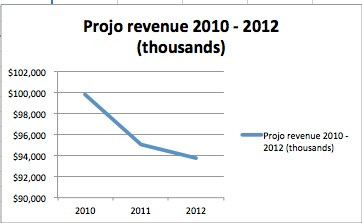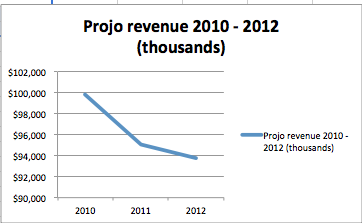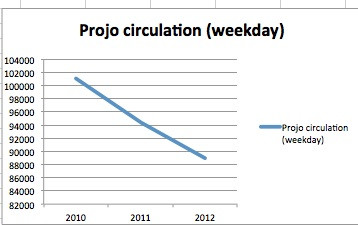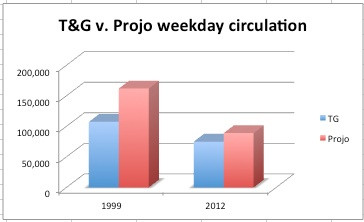Starkman: For the ProJo, a Time of Great Promise and Greater Peril
Friday, December 13, 2013
Okay. It ‘s now or never for the Projo. Go time.
The Providence Journal may have faced greater moments of peril and promise in its 184-year-history – this is the oldest continuously published daily paper in the country, after all – but few can have been as fraught as the one it is facing right now.
With A.H. Belo – finally –putting the newspaper on the auction block, the Rhode Island institution that once dominated the state’s public agenda, battled organized crime to a standstill, and rooted out corruption at both the state and local level, is facing an existential crisis, a point of no return.
GET THE LATEST BREAKING NEWS HERE -- SIGN UP FOR GOLOCAL FREE DAILY EBLASTThe Belo remote-control reign from Dallas has been a flat disaster, even taking into account the digital earthquake transformation now wrecking the entire newspaper industry.
Reaction and retreat
The Belo strategy, if you can call it that, has been one of reaction and retreat: responding to each leg down in the paper’s fortunes by heedlessly cutting expenses – including its crown jewel, the newsroom -- to make up for revenue shortfalls rather than looking beyond the near-term and reinvesting in franchise while waiting for better times.
That made sense only if the object was to squeeze near-term profits and wind down the enterprise. This approach was short-sighted because hidden within the digital transformation has also been an economic downturn and slow recovery. It’s the difference between what economists call a secular decline, which his permanent, versus a cyclical one, which is temporary. The temporary one will eventually end. Rhode Island was not always an economic basket case. That took some doing, including a mortgage crisis, courtesy of the financial sector, that hit RI harder than elsewhere.
One day, and that may be coming sooner than many think, Rhode Island’s economy will recover, and readers, and yes, even some advertisers, will be looking for a local news franchise with both a print platform and with the horsepower to provide a quality comprehensive local report, as well as a venue for engagement and community. The key words are “quality” and “comprehensive.”
As I wrote elsewhere, newspapers have little to offer any more than the content they provide. They no longer have monopoly control over the supply of local ads needed by everyone from the big car dealers to the guy with a lawn mower to sell in West Warwick. It’s now about the news.
Precious little
And Belo has done precious little to maintain the integrity of the newsroom, closing all nine local news bureaus in a panic move after the financial crisis, and trimming Guild members, including both editorial and ad personnel, to about 160, according to John Hill, president of the local Guild. That number typically runs about 60 percent editorial, so we’re looking at total newsroom – reporters, editors, photographers, graphic artists, the whole ball of wax – of about 100, give or take.
That, Rhode Island, is a very, very small number. When I worked there early to mid-1990s, there were more than a 100 reporters alone, a small army. We could deploy a dozen reporters just to cover RISDIC.
Historical figures for Guild-represented newsroom-only employees are not available but here is a graphic of all union-represented workers (including non-Guild unions), which gives a feel for the extent of the labor-force destruction in the last decade:
And here is a greatest “hits” of destruction of the franchise in the last three years according to other key metrics. All figures are from Belo’s Securities and Exchange Commission filings.
Revenue:
Circulation:
Circulation in relation to national trends:
Down another leg
And, my favorite, Projo circulation in relation to the hapless Telegraph & Gazette, all of 40 miles away, which, while hardly an editorial powerhouse, has fallen at a slower pace, managing to almost catch up to the once-dominant Projo in a backwards circulation race to the bottom:
Keep in mind that crash came when the rest of the industry had started to stabilize.
Hill, the union president, pluckily asserts that there is value in the paper and reporting power in the newsroom.
“When the economy does come back, this paper is going to very nicely placed,” he says.
But everything – absolutely everything – is riding on the identify of the next owner. And therein lies hope, but more peril.
Moguls and financiers
The peril comes from the fact that there are precious few newspaper buyers in the market these days, and they come in two basic categories: moguls and financial players.
The mogul bit has its own problems, again, as I wrote elsewhere.
But I’d take my chances on a John Henry, buyer of the Boston Globe, or even Jeff Bezos, Amazon’s relentless Amazon chief and new owner of The Washington Post. At least in those cases, there’s at least a chance that a long-term, perhaps even civic-oriented strategy would be implemented (in fact, those two concepts go together).
The fact is, there is a real honest-to-goodness chance to make a go of it with the Projo. It has a brand, an institutional memory, and, despite Belo, some real value left. The newsroom is depleted past healthy levels and its digital game needs massive work and investment. But the potential is there. A lot of speculation centers around how much the paper will sell for but for Rhode Island readers this is not the main issue. That’s Belo’s problem. The fact is, the lower the sale price, the better for the Projo. A lower cost basis for whoever buys it will increase the return for the buyer, give the paper more breathing room, and leave more on the table for reinvestment. So, root for a fire-sale price.
Peril lurks
Finally, beware of the financial players, and these days, that means Gatehouse Media Inc. As I wrote earlier, Gatehouse is Wall Street-controlled and born in 2005 of a financial strategy to take on debt and pay dividends to owners rather than invest in content.
That strategy landed Gatehouse in bankruptcy just this year. But the chain is prepared to emerge and, believe or not, go on an acquisition spree.
In September, an affiliate of Gatehouse’s parent company bought the Cape Cod Times, the New BedfordStandard Times, and Portsmouth Herald, in New Hampshire, and other assets from Rupert Murdoch’s News Corp.
Now it’s said to be in the market for Telegraph & Gazette, put on the block by the same John Henry.
Gatehouse is larger and better capitalized than Belo: it has 78 dailies while Belo has one main one, the Dallas Morning News. But for all intents and purposes their strategies are indistinguishable. When the going gets tough, Gatehouse has little more than cuts to offer.
That strategy, the Belo approach, has bled the Projo white. The paper can’t afford another owner like that.
Related Slideshow: Changing Newspaper Industry
In a column entitled, The smartest guys in media give up on print, Alan Mutter, the former editor of San Francisco Chronicle, writes "For all the corporate-speak accompanying the dramatic restructurings of Twenty-First Century Fox, Time Warner and Tribune Co., the simple reason these diversified media giants are jettisoning their publishing assets is that their leaders fear for the future of print."
Throughout New England and across the country there is a dramatic decline in the print newspaper business.
Related Articles
- Dean Starkman: March of the Undead Newspapers
- Providence Journal’s Parent Company A.H. Belo Suffers More Losses
- Dean Starkman: Telegram & Gazette Becomes a Thanksgiving Leftover
- Starkman: Memo to Belo - Now, Sell the Projo
- Pulitzer Prize-Winning Reporter Dean Starkman Joins GoLocal
- Chafee’s Ownership in the ProJo - Should They Disclose?
- Upside-Down Priorities At the ProJo’s Parent
- Attorney General: Providence Journal Operating Illegally
- NEW: A.H. Belo Announces Providence Journal for Sale
- Guest Mindsetter: Journalism in the Age of Digital Literacy











_front_page_348_599_90.jpg)



_front_page_80_80_90_c1.jpg)
